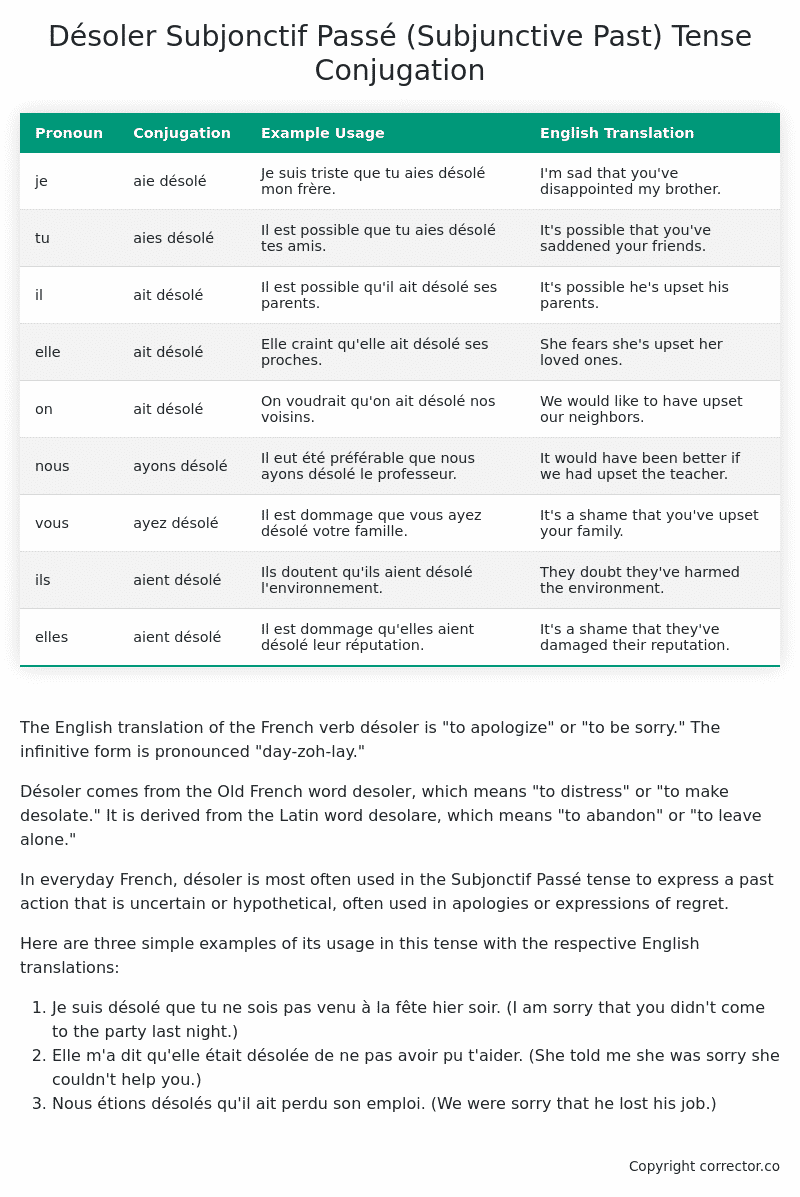Subjonctif Passé (Subjunctive Past) Tense Conjugation of the French Verb désoler
Introduction to the verb désoler
The English translation of the French verb désoler is “to apologize” or “to be sorry.” The infinitive form is pronounced “day-zoh-lay.”
Désoler comes from the Old French word desoler, which means “to distress” or “to make desolate.” It is derived from the Latin word desolare, which means “to abandon” or “to leave alone.”
In everyday French, désoler is most often used in the Subjonctif Passé tense to express a past action that is uncertain or hypothetical, often used in apologies or expressions of regret.
Here are three simple examples of its usage in this tense with the respective English translations:
- Je suis désolé que tu ne sois pas venu à la fête hier soir. (I am sorry that you didn’t come to the party last night.)
- Elle m’a dit qu’elle était désolée de ne pas avoir pu t’aider. (She told me she was sorry she couldn’t help you.)
- Nous étions désolés qu’il ait perdu son emploi. (We were sorry that he lost his job.)
Table of the Subjonctif Passé (Subjunctive Past) Tense Conjugation of désoler
| Pronoun | Conjugation | Example Usage | English Translation |
|---|---|---|---|
| je | aie désolé | Je suis triste que tu aies désolé mon frère. | I’m sad that you’ve disappointed my brother. |
| tu | aies désolé | Il est possible que tu aies désolé tes amis. | It’s possible that you’ve saddened your friends. |
| il | ait désolé | Il est possible qu’il ait désolé ses parents. | It’s possible he’s upset his parents. |
| elle | ait désolé | Elle craint qu’elle ait désolé ses proches. | She fears she’s upset her loved ones. |
| on | ait désolé | On voudrait qu’on ait désolé nos voisins. | We would like to have upset our neighbors. |
| nous | ayons désolé | Il eut été préférable que nous ayons désolé le professeur. | It would have been better if we had upset the teacher. |
| vous | ayez désolé | Il est dommage que vous ayez désolé votre famille. | It’s a shame that you’ve upset your family. |
| ils | aient désolé | Ils doutent qu’ils aient désolé l’environnement. | They doubt they’ve harmed the environment. |
| elles | aient désolé | Il est dommage qu’elles aient désolé leur réputation. | It’s a shame that they’ve damaged their reputation. |
Other Conjugations for Désoler.
Le Present (Present Tense) Conjugation of the French Verb désoler
Imparfait (Imperfect) Tense Conjugation of the French Verb désoler
Passé Simple (Simple Past) Tense Conjugation of the French Verb désoler
Passé Composé (Present Perfect) Tense Conjugation of the French Verb désoler
Futur Simple (Simple Future) Tense Conjugation of the French Verb désoler
Futur Proche (Near Future) Tense Conjugation of the French Verb désoler
Plus-que-parfait (Pluperfect) Tense Conjugation of the French Verb désoler
Passé Antérieur (Past Anterior) Tense Conjugation of the French Verb désoler
Futur Antérieur (Future Anterior) Tense Conjugation of the French Verb désoler
Subjonctif Présent (Subjunctive Present) Tense Conjugation of the French Verb désoler
Subjonctif Passé (Subjunctive Past) Tense Conjugation of the French Verb désoler (this article)
Subjonctif Imparfait (Subjunctive Imperfect) Tense Conjugation of the French Verb désoler
Subjonctif Plus-que-parfait (Subjunctive Pluperfect) Tense Conjugation of the French Verb désoler
Conditionnel Présent (Conditional Present) Tense Conjugation of the French Verb désoler
Conditionnel Passé (Conditional Past) Tense Conjugation of the French Verb désoler
L’impératif Présent (Imperative Present) Tense Conjugation of the French Verb désoler
L’infinitif Présent (Infinitive Present) Tense Conjugation of the French Verb désoler
Struggling with French verbs or the language in general? Why not use our free French Grammar Checker – no registration required!
Get a FREE Download Study Sheet of this Conjugation 🔥
Simply right click the image below, click “save image” and get your free reference for the désoler Subjonctif Passé tense conjugation!

Désoler – About the French Subjonctif Passé (Subjunctive Past) Tense
Formation of the Subjonctif Passé
Everyday Usage Patterns
Interactions with Other Tenses
Present tense
Future tense
Conditional
Summary
I hope you enjoyed this article on the verb désoler. Still in a learning mood? Check out another TOTALLY random French verb conjugation!


